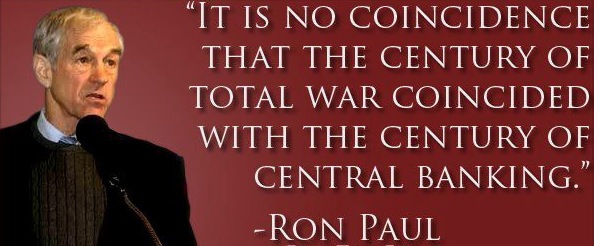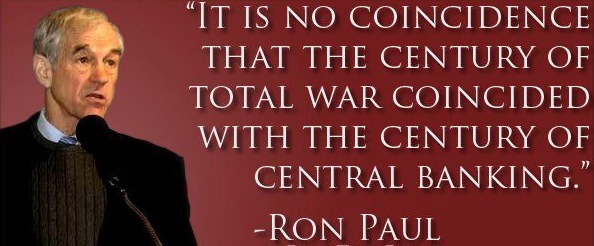
It’s July 17th, which means that Ron Paul’s new book “Swords Into Plowshares” is finally available. And what a book it is. Only the hardest of hearts and most closed of minds could read Dr. Paul’s new book and fail to be convinced of the futility of war. But what interests us the most is Dr. Paul’s discussion of the connection between central banking and war. Almost since the first banks were developed, bankers have funded government wars in exchange for receiving privileges from government. The relationship continues today, but very few politicians ever touch on it. So what does Dr. Paul have to say about central banking and warmaking?
Dr. Paul’s book starts off with personal reminiscences of life during times of war. It includes his personal experiences during World War II, his awareness of the possibility of being drafted to fight in Korea, and his eventual drafting into the Air Force during the Vietnam War. Included among his personal recollections are his comments on rationing during World War II. As a child, that was just the system that was in place, but his future understanding of Austrian economics allowed him to look back on that period of time and realize how detrimental to an economy war could be. In particular, it allowed Dr. Paul to continuously fight against those economists who repeat the lie that government spending in World War II pulled the United States out of the Great Depression. Au contraire – the government war effort did nothing for the common man, as the rationing system merely extended the misery of the Depression.
Of real interest too is Dr. Paul’s discussion of how his views developed over time. While his personal experiences always led him to be uncomfortable with the idea of war, his nascent antiwar impulses took a long time to manifest themselves fully.
Throughout the first half of the book, Dr. Paul sprinkles in comments about the economic destructiveness of war, but in Chapter Nine he really gets to the heart of the matter. Economic factors always play a major role in war, often with one side seeking to gain an economic advantage over the other and using war to try to bring that about. Dr. Paul bemoans the wastefulness of military spending.
When we hear that the US just spent $X billion for drone missiles, we must immediately ask: “instead of what?” In other words, what else could have been achieved if that $X billion had been spent by the individuals who earned the money rather than by some nameless bureaucrat serving a powerful special interest? It should be obvious which scenario would most benefit the economy.
This hearkens back to the great French economist Frederic Bastiat’s lesson on what is seen and unseen. Too many people in the United States love to tout the “jobs” created by the military-industrial complex. But all that defense contractors produce is overpriced, under-performing military hardware whose ultimate final goal is either to be destroyed in combat or to be retired a few years down the road as obsolete. How much better would it be if, instead of producing things to be destroyed, all that money could be used to produce items of actual value to consumers, investing in capital equipment that will be cared for and repaired and that will produce things that consumers actually want.
There are occasional passages that seem pessimistic, although they perhaps are more an acknowledgement that there are so many people who have become dependent on government largesse for their livelihoods than they are pessimistic statements about the future.
Even with the great strides we’ve made in promoting free-market Austrian economics education, politics, for now, will prevent the implementation in a peaceful and deliberate fashion of the reforms required to solve our problems. The collapse of the system is probably required before the people give up their dependency on welfare solutions and government’s so-called responsibility to redistribute wealth. The longer today’s conditions last the more likely more major wars will break out as happened before with the Great Depression.
Because in the end, Dr. Paul always remains upbeat and positive about the possibilities for the future.
A grand opportunity presents itself for true free-market principles to prevail along with a transition away from the militarism of empire to a policy of peace, friendship, and trade with all willing nations.
In Chapter Ten, Dr. Paul gets into the heart of central banking and the important part central banks play in war. Governments can only borrow and tax so much before lenders cease to lend and taxpayers get fed up. So governments call on central banks to debase the currency, funding their wars silently and indirectly through inflation. This connection between central banking and warmaking is one that so many fail to see. Many antiwar activists fail to understand the role that central banks play in funding war. But there are also some people who oppose the Federal Reserve and central banking yet who remain bellicose in their foreign policy positions. Dr. Paul makes a great case for why central banking interventionism and foreign policy interventionism go hand in hand – you can’t have one without the other.
Dr. Paul goes on in the rest of the book to tackle head-on some of the popular misconceptions of and arguments against non-interventionism, including taking on the old epithet of “isolationism” that is often used by foreign policy hawks. He also argues against many of the popular misconceptions that cause people to blindly and unthinkingly support interventionist military adventures. Finally, he goes to great lengths to describe the many ways in which militarism and interventionism erode our freedoms, describes a number of things that need to occur in order to return to limited government, and provides sound advice for how to bring that about. There really is a revolution in thinking taking place in this country as people are becoming aware of how overbearing the government is, and Dr. Paul and his views are still at the forefront of that movement.
Even to those who are well-versed in Dr. Paul’s foreign policy positions, this book is a refreshing and invigorating read and is packed with all sorts of new and useful insights. And because Dr. Paul writes for the layman, this would be a wonderful book to recommend to friends or family members who may be beginning to open their eyes to what is going on in the world. How many times have you heard someone say, “Well, I’m not really sure I can support Ron Paul, I’m not sure his ideas would work,” or something along those lines? Nobody who takes the time to read this book with an open mind could fail to be convinced of the case for non-interventionism, limited government, and real freedom.
Reprinted with permission from the Carl Menger Center.

